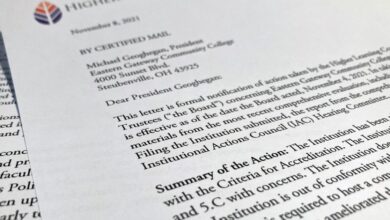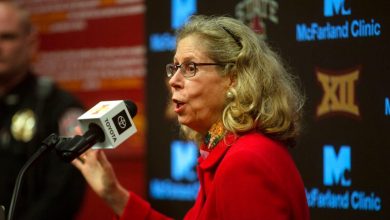Can Colleges Lift Employees’ Morale?

Then the pandemic hit. After March 2020, many who work at colleges describe the same levels of burnout and dissatisfaction as any other industry.
The economic fallout from Covid-19 initially led to more than 400,000 job losses in higher education, according to figures from the Bureau of Labor Statistics. While nearly all of those jobs have been recovered, many campuses are still challenged to find and retain enough employees. Tenure-track faculty, who hold what is considered the most desirable jobs on a campus, are leaving academe because of “concerns about disrespect, inadequate compensation, and an unsustainable work/life balance,” Josh Dolezal, who quit his job as a professor of English at the end of 2021, wrote in The Chronicle Review.
A recent survey of college leaders for The Chronicle found that two-thirds of respondents said the difficulties in hiring new employees had increased over the course of 2022, especially for jobs in information technology, dining services, building services, financial operations, and human resources.
College administrators have been trying to improve morale on campus by increasing pay, making work schedules more flexible and offering perks to reduce stress on the job. At the same time, the increased costs of that effort can put stress on other parts of the institution’s budget.
Northern Kentucky University, for example, is planning to spend at least $35 million over five years to increase pay and benefits and has put in place measures to improve working conditions. Not far away, the University of Kentucky has doubled the amount of money it is spending on pay increases, and it’s also taking special steps to ease the stress on student-affairs staff.
Many university employees stay because they believe in the mission of higher education, said Margaret W. Sallee, an associate professor of higher education at the University at Buffalo. “But at some point,” she said, “the mission is not enough.”
Pay increases are important, said Sallee, but colleges need to ensure that efforts to reduce stress really benefit workers. For example, allowing a four-day workweek, Sallee said, isn’t helpful if colleges still expect employees to have the same amount of productivity.
“We’re changing our practices,” she said, “but not our expectations of people.”
The result, Cecil said, is that it’s making it harder for the university to hang onto its staff in a competitive economy. “People are tired and they’re making decisions to leave for other jobs or just leave the work force entirely,” he said in an email. “Universities are like every other employer: We are struggling to find people to hire so we’d like to keep the people we have.”
How do we progress toward our goals, yet still allow space for individual healing?
In late June, for example, Northern Kentucky had a job opening for a staff member to manage the supplies needed for chemistry lab sections. The advertised job would pay a minimum of about $40,000 a year for someone with a bachelor’s degree — about the same as the starting salary for someone with a similar credential in Cincinnati, according to data from ZipRecruiter.
Despite a relatively competitive starting salary, it took six weeks before even a handful of people applied for the job, said John Farrar, associate professor of chemistry at Northern Kentucky and president of the Faculty Senate. The vacancy had an impact on faculty and students, Farrar said, because one of the lab sections had to be canceled.
To try to keep existing employees, the university is starting with a 3 percent raise for nearly all employees, along with some larger increases for some longtime staff members whose pay has been “compressed,” meaning their salary is not far above those with similar jobs who started more recently. The university intends to increase some faculty salaries in the next part of the plan.
“Faculty understand staff are important and paying them close to market wage is good for everybody,” said Farrar. “We’d also like more money for the faculty.”
Faculty morale tanked during the pandemic, Farrar said, because of the shifting work demands and social isolation. With operations mostly in person, the mood is improving and is almost back to something like “normal,” Farrar said, but still seems fragile and could easily deteriorate again. Campus leaders need to recognize that healing the trauma of the pandemic will take a lot of time and empathy.
“The temptation is to just move on and push people to just get over it,” Farrar said. “This presents a monumental challenge for the leader, at least the one who cares about people. How do we progress toward our goals, yet still allow space for individual healing?”
More significantly, the university administration approved a new policy allowing six weeks of paid parental leave, and has left in place flexibility for remote work. In the registrar’s office, for example, only two of the 14 employees work on campus, Cecil said, and only one of his own staff members (besides himself) is in the provost’s office.
A group of faculty is also studying the campus climate for employees, to see if the new measures are effective.
The challenge for many institutions is that improving the work culture comes at a cost, Cecil said, especially for regional public universities that may be losing enrollment and don’t get the same amount of appropriation or tuition as the larger institutions in the state.
Since the start of the pandemic, Northern Kentucky’s overall enrollment has dropped 2.5 percent, according to university data, including a 9 percent decline in undergraduates. While the university’s budget grew by about 2.5 percent this year, all the new money will be spent on the pay increases, Cecil said. At the same time, the university is cutting student financial aid by 11 percent, and spending on auxiliary enterprises, such as athletics and parking, will fall almost 10 percent, according to university figures.
“To no one’s surprise, we have found that all of those changes to benefit our employees have put our budget in a difficult spot,” Cecil wrote in an email. “They were all the right decisions, and we’re not rolling anything back. The pressure that regional public universities are under means we’re now embarking on cuts and realignments to balance our budget.”
The pressures to improve working conditions remain high at more prominent institutions, including places that may compete with Northern Kentucky for both staff and faculty.
For example, the University of Kentucky, about 80 miles away, has doubled the amount it typically spends on pay increases to $17 million in its current budget.
The university is also providing some specific benefits for the 400 student-affairs employees, such as those who work in academic advising, enrollment management, and residence life. Those measures grew out of a pilot program that began in 2019 but was interrupted by the pandemic.
The focus on student-affairs staff members is important because they are the frontline employees who deal with students at the most difficult moments, said Kirsten Turner, vice president for student success at Kentucky.
“Many of our team members remained on campus throughout [the pandemic] or were the first to return when people and students came back to campus,” Turner said. “They were responding to student issues while also navigating their own situations during the pandemic.”
To ease the stress those workers experience, the university is offering them a variety of perks, including a $300 credit for the campus’s integrative medicine center, where they can get a massage or acupuncture treatments, for instance. Student-affairs employees are also receiving 50 meals at campus dining facilities and free memberships to campus gyms.
The benefits were developed from a series of conversations and focus groups with student-affairs staff, Turner said, and are meant to respond to their needs, not what the administrators assumed they might want. The university will also follow up to study how effective the measures are, she said.
Leaders of the Staff Senate didn’t respond to a request for comment on the university’s efforts.
So far, it’s hard to know whether the kinds of pay hikes and perks institutions are offering will make a difference, said Kevin McClure, an associate professor of higher education leadership at the University of North Carolina at Wilmington.
Employees may not feel that modest pay increases really make a difference in their lives, he said, and it’s been hard for administrators to understand the possible costs and benefits of other measures like reducing workload or more flexible scheduling.
“I can’t say I’ve seen many examples,” McClure said, “of institutions that are really trying to become leaders in this space.”
Source link






